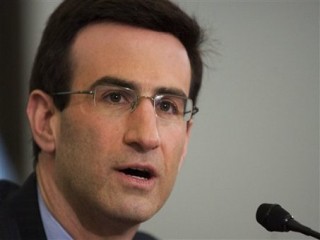
Orszag Peter biography
Date of birth : 1968-12-16
Date of death : -
Birthplace : Boston, Massachusetts, United States
Nationality : American
Category : Politics
Last modified : 2010-06-24
Credited as : Federal official and economist, director of the Office of Management and Budget and CBO, Obama administration
0 votes so far
In 2008, incoming President Barack Obama named Peter Orszag as the director of the Office of Management and Budget in his administration. Orszag had served as the director of the Congressional Budget Office (CBO) in the last years of President George W. Bush's time in office. Orszag was an economist who had previously held academic posts, and had worked at the Council of Economic Advisors and National Economic Council and for the Sebago Associates.
Orszag was born on December 16, 1968, in Boson, Massachusetts, the son of Steven Alan and Reba (Karp) Orszag. His father was a professor of mathematics who taught at Yale and Princeton, while his mother owned a research and development company, Cambridge Hydrodynamics. An academically gifted student, Orszag earned a bachelor's degree in economics summa cum laude from Princeton University in 1991. The winner of a Marshall scholarship, he then attended the London School of Economics (LSE), where he earned a master's degree in 1992.
Worked for the Council of Economic Advisors
After spending a year as an economic adviser to the Ministry of Finance in Moscow from 1992 to 1993, Orszag returned to the United States where he held a series of positions at the Council of Economic Advisors in the early to mid-1990s. He also spent time in London, serving as a professor on the research staff at the LSE and earning a doctorate there in 1997.
With his Ph.D. in hand, Orszag served as a senior economic advisor for the National Economic Council at the White House in 1997. The following year he became the special assistant for economic policy in President Bill Clinton's administration, under the auspices of the same group. After the end of the Clinton presidency, Orszag co-founded Sebago Associates, an economic and public policy consulting firm. He served as its president until 2007.
While working at Sebago, Orszag also served as a lecturer in economics at the University of California at Berkeley from 1999 to 2000. He went east in 2000 to take a position at Boston College. There, he was a research associate at the Center for Retirement Research before becoming the deputy director of economic policy at the Brookings Institute.
Named Head of the CBO
In January of 2007, Orszag left both academia and his consulting company to begin serving what was to be a four-year appointment as the director of the Congressional Budget Office. There he focused primarily on healthcare policy and climate change issues. Orszag regarded rising health care issues as one of most important budget issues in the United States.
By November of 2008, however, the incoming Obama administration wanted to use Orszag's economic skills and know-how in a different capacity. Orszag was selected as the director of the Office of Management and Budget, and was confirmed by the U.S. Senate in early 2009. In this post, Orszag will be Obama's main budget director, providing oversight of the federal budget and offering his opinions on economic policies and budget priorities.
The selection of Orszag for the position was widely praised as the United States faced a difficult economic crisis. Republican Senator Judd Gregg told Carolyn Lochhead of the San Francisco Chronicle, "In the choice of Peter Orszag, they've sent a fairly strong message by picking a guy who first understands the depth of the problem, and secondly has worked positively to take on the issues of entitlements. It's good to have somebody of his stature and philosophy in that slot. ... He cares deeply about the long-term fiscal responsibility of government."
















